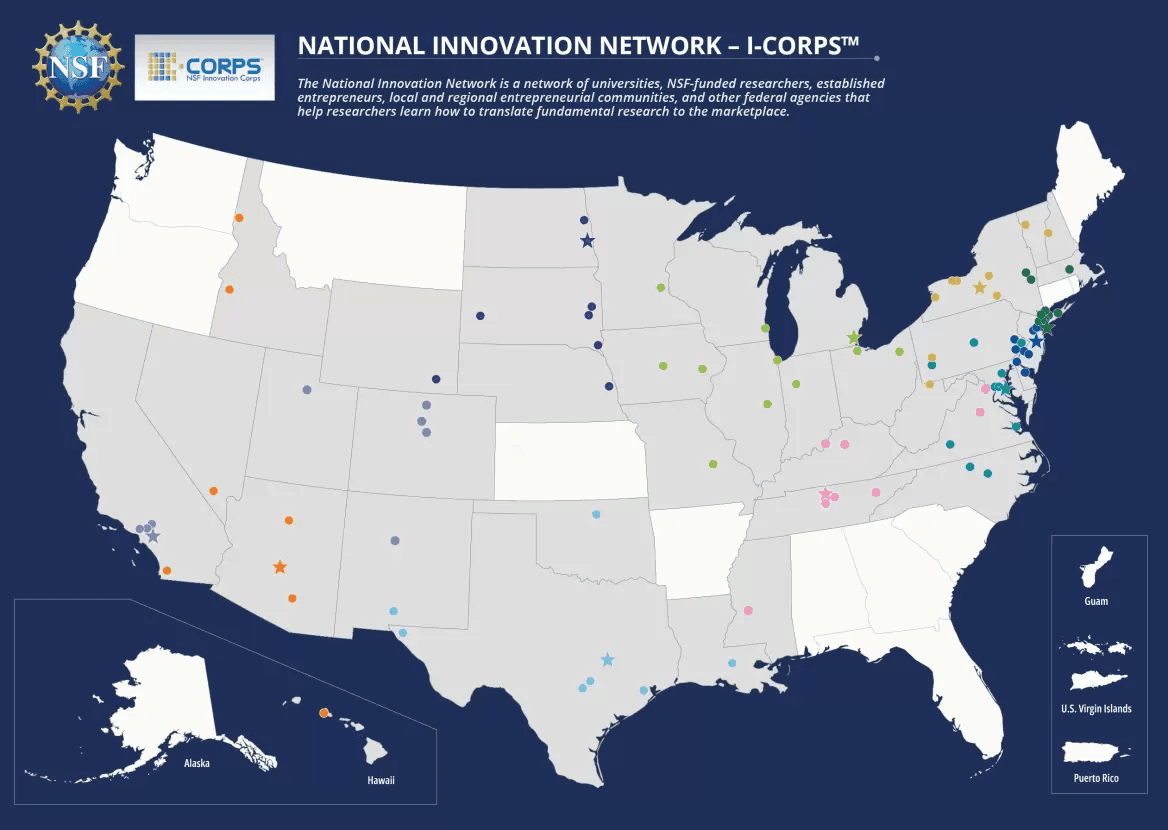Innovation Within Team
March 20, 2024
In the ever-evolving landscape of entrepreneurship and innovation, having the right resources and support can make all the difference between success and failure. The National Science Foundation's Innovation Corps (NSF I-Corp) program stands out as a beacon for budding entrepreneurs and researchers looking to commercialize their ideas. This program, designed to cultivate innovation and bridge the gap between academia and the market, provides participants with invaluable tools, mentorship, and funding to turn their potentially groundbreaking concepts into viable products and services.
The NSF I-Corp Program is not just about financial support; it is a comprehensive initiative that provides teams with the critical skills and knowledge to conduct thorough customer interviews, gaining deep insights into their market, which is critical in the complex journey of bringing innovations to market. This hands-on experience helps participants understand their market as it relates to their business models, ensuring that their business models are grounded in real customer needs and market realities. Through its structured approach and access to a vast network of mentors and industry experts, NSF I-Corp empowers innovators to refine their ideas, validate their business models, and accelerate their paths to success.
In this blog post, we will delve into the various aspects of the NSF I-Corp Program, exploring its structure, benefits, and impact on startups and innovations. We will also address some of the challenges and criticisms the program faces and look at its future prospects. By the end, you will have a clear understanding of why the NSF I-Corp Program is a vital catalyst for innovation and how it continues to shape the entrepreneurial landscape.
Overview of NSF I-Corp Program
The NSF I-Corp Program, short for the National Science Foundation Innovation Corps, is a landmark initiative aimed at nurturing innovation and entrepreneurship across the United States. Established in 2011, the program's primary mission is to help researchers and scientists transition their academic findings into commercially viable products and services. By doing so, NSF I-Corp bridges the often daunting gap between laboratory discoveries and market realities.
The origins of the NSF I-Corp Program trace back to the realization that many promising research outcomes were not making it to the marketplace due to a lack of entrepreneurial knowledge and experience among scientists. To address this, the National Science Foundation designed a program that would provide structured support, combining education, mentorship, and funding. The result is a comprehensive framework that guides participants through the process of commercializing their innovations.
At its core, the NSF I-Corp Program targets academic researchers, early-stage startups, and entrepreneurs who are keen on transforming their technological breakthroughs into market-ready solutions. The program offers a rigorous training regimen that includes customer discovery, market validation, and business model development. Participants are grouped into teams, typically comprising an academic lead (the principal investigator), an entrepreneurial lead (often a graduate student or postdoc), and a business mentor with industry experience.
The importance of the NSF I-Corp Program in the entrepreneurial ecosystem cannot be overstated. By nurturing a culture of innovation, the program not only helps in bringing scientific discoveries to the public but also contributes to economic development by creating new companies and job opportunities. Furthermore, the NSF I-Corp Program serves as a model for similar initiatives globally, demonstrating the powerful impact of supporting early-stage innovators through structured guidance and resources.
With a decade of successful outcomes and numerous success stories, the NSF I-Corp Program continues to be a cornerstone of the National Science Foundation’s efforts to promote technological advancement and entrepreneurial growth. Its emphasis on practical training and real-world application has made it an indispensable tool for scientists and entrepreneurs striving to make a difference in their fields.
Structure of NSF I-Corp Program
The National Innovation Network (NIN) is structured around I-Corps Hubs, which replaced the former Nodes and Sites model. The I-Corps Hubs serve as the backbone of the program, delivering critical training, expansion, and evaluation functions across the United States.
Training:
I-Corps Hubs are responsible for delivering regional I-Corps training at partner institutions. They provide staff for national instructional teams, ensuring that participants receive high-quality, consistent entrepreneurial education.
Expansion:
The Hubs play a crucial role in expanding the program's reach. They identify, recruit, and support teams for regional training and recommend promising teams for the national program. Additionally, Hubs work to grow the network by identifying new member institutions, fostering a more inclusive and extensive innovation ecosystem.
Evaluation, Assessment, and Research:
Hubs collect and analyze data to assess their performance and conduct research on entrepreneurship. This ongoing evaluation helps improve program effectiveness and provides valuable insights into best practices for fostering innovation.
Currently, there are ten geographically distributed I-Corps Hubs, spanning 94 academic institutions across 40 states and the District of Columbia. While existing Nodes and Sites will continue to operate until the end of their funding cycles, all future NIN expansion will be through the Hubs program.
National Reach and Impact:
Each I-Corps Hub consists of a regional alliance of at least eight universities, collectively funded at $3 million per year for five years. These Hubs aim to build a diverse and inclusive innovation ecosystem by bringing together scientists, engineers, entrepreneurs, business leaders, and industry partners from across the country. The collaborative efforts of the Hubs ensure that NSF-funded research is effectively translated into marketable products and services, contributing significantly to the nation's economy.

Benefits of NSF I-Corp Program
The NSF I-Corp Program offers a multitude of benefits to participants, making it an invaluable resource for researchers and entrepreneurs aiming to commercialize their innovations. These benefits encompass financial support, expert mentorship, hands-on training, and extensive networking opportunities, all designed to maximize the potential for successful market entry.
Financial Support and Grants:
One of the most significant benefits of the NSF I-Corp Program is the financial support it provides. Teams receive grants to cover costs associated with customer discovery, travel, and other essential activities. This funding is crucial for early-stage innovators who often face financial constraints that can hinder their ability to explore market opportunities and validate their ideas. By alleviating these financial burdens, the NSF I-Corp Program enables teams to focus on refining their innovations and developing viable business models.
Access to Expert Mentorship and Networking Opportunities:
Mentorship is a cornerstone of the NSF I-Corp Program. Participants benefit from the guidance of seasoned industry professionals and successful entrepreneurs who bring a wealth of experience and insights. These mentors help teams navigate the complexities of the commercialization process, offering personalized advice on strategy, market positioning, and overcoming specific challenges.
In addition to mentorship, the program offers extensive networking opportunities. Participants connect with potential customers, investors, industry partners, and fellow entrepreneurs. These connections can open doors to new opportunities, collaborations, and partnerships essential for scaling innovations.
Hands-On Experience and Entrepreneurial Training:
The NSF I-Corp Program emphasizes practical, hands-on experience through its comprehensive training regimen. Participants engage in customer discovery activities, conducting interviews and gathering feedback directly from potential users. This real-world engagement helps teams validate their assumptions, refine their value propositions, and develop products that meet market needs.
The program’s entrepreneurial training covers critical aspects of business development, including market analysis, value proposition design, customer segmentation, and go-to-market strategies. These sessions equip participants with the skills and knowledge required to transform their scientific and technical expertise into successful commercial ventures.
Success Stories and Testimonials:
Numerous success stories illustrate the program's effectiveness. For example, RevOpsis Therapeutics, an I-Corps alumni company, secured $16.5 million in seed funding to advance their macular degeneration treatment. The training and customer discovery processes provided by the NSF I-Corp Program were instrumental in refining their product and business model.
Another example is The Care’digan™ by Oceeto. Andrea and Austin Hess developed a practical and stylish garment to help caregivers manage childcare messes. Through the NSF I-Corps Northeast Hub’s Propelus training program, they connected with industry mentors and conducted thorough customer discovery. This support was crucial in advancing their product and bringing it closer to market.
Enhanced Credibility and Visibility:
Participation in the NSF I-Corp Program enhances the credibility and visibility of teams and their innovations. Being associated with a prestigious program backed by the National Science Foundation lends a level of recognition and trust advantageous when engaging with investors, partners, and customers. This increased credibility can facilitate more effective fundraising efforts and attract strategic partners.
Impact on Startups and Innovations
The NSF I-Corp Program has significantly impacted startups and innovations, transforming groundbreaking research into market-ready products and services. Its structured approach and comprehensive support enable startups to achieve critical milestones, fostering technological advancements and economic growth.
Transformation of Startups and Research Projects:
The NSF I-Corp Program excels at turning academic research projects into viable commercial ventures. Researchers often possess innovative ideas but lack entrepreneurial skills and market insights. The program bridges this gap by providing training and resources to navigate commercialization. Participants engage in customer discovery and market validation, gaining a deep understanding of their target markets and customer needs. This knowledge is crucial for developing products that address real market problems, increasing the likelihood of commercial success.
Case Studies of Successful Companies:
Numerous companies have achieved remarkable success through the NSF I-Corp Program. BioBots, for instance, began as a research project at the University of Pennsylvania. Through the program, the founders refined their product and business model, transforming BioBots into a thriving company in the biotech industry. Similarly, Lucid Circuit, specializing in energy-efficient AI hardware, leveraged the program to validate their technology and secure partnerships with major industry players. These case studies highlight the program's effectiveness in accelerating the journey from idea to market.
Long-Term Impact on Technology Commercialization:
The program's long-term impact extends beyond individual success stories. By fostering a culture of innovation and entrepreneurship, it contributes to the broader ecosystem of technology commercialization. Many participants continue to use the skills and knowledge gained from the program in subsequent ventures, driving further innovation and economic development. The focus on customer discovery and market validation has influenced startups' approach to commercialization, promoting a customer-centric methodology that leads to better product-market fit.
Supporting Diversity and Inclusion in Entrepreneurship:
The NSF I-Corp Program is committed to diversity and inclusion, providing opportunities for researchers and innovators from diverse backgrounds. This inclusivity enhances the innovation ecosystem by incorporating a wide range of perspectives and ideas, leading to more comprehensive solutions to societal challenges.
Impact on the Broader Economy:
Startups and innovations emerging from the NSF I-Corp Program have a ripple effect on the broader economy. Successful companies create jobs, attract investment, and contribute to economic growth. Technological advancements driven by these startups improve various sectors, from healthcare and energy to manufacturing and information technology. The program’s emphasis on practical training, mentorship, and market validation has enabled numerous startups to achieve success and make significant impacts.
Challenges and Adaptations
While the NSF I-Corp Program has many strengths, it also faces several challenges. Understanding these challenges helps to refine the program and enhance its effectiveness for future participants.
Common Challenges Faced by Participants:
One primary challenge participants encounter is the intensive time commitment required. The program demands significant effort in customer discovery, market research, and developing a business model, which can be overwhelming for researchers already managing academic responsibilities. Balancing these demands can be particularly difficult for early-career researchers who may lack experience in entrepreneurial activities.
Another challenge is the steep learning curve associated with entrepreneurship. Many participants come from academic backgrounds with limited business knowledge, making it difficult to grasp complex concepts quickly. This can result in slower progress and potential frustration as teams navigate unfamiliar territory.
Additionally, the competitive application process ensures that high-potential projects are chosen, but it can exclude promising innovations that might not yet be fully developed. This competitive nature may discourage some researchers from applying, particularly those from underrepresented groups or smaller institutions with fewer resources.
Addressing Challenges and Adaptations:
To tackle the steep learning curve, the program includes comprehensive training sessions that cover the basics of entrepreneurship. These sessions are designed to be accessible and engaging, helping participants build the necessary skills and confidence.
Regarding the competitive application process, efforts are being made to increase outreach and support for underrepresented groups. This includes providing pre-application guidance and creating pathways for those with less experience in commercialization to participate.
Additionally, teams can leverage third-party solutions to streamline their processes. Platforms like Innovation Within provide AI-driven tools that simplify customer discovery and market validation, offering clarity on who to engage with and what to ask. By utilizing such solutions, teams can save time, reduce errors, and enhance their market research efforts.
Future of NSF I-Corp Program
As the landscape of innovation and entrepreneurship continues to evolve, the NSF I-Corp Program is poised to adapt and expand, ensuring it remains a vital resource for researchers and entrepreneurs.
Upcoming Changes and Improvements:
The NSF I-Corp Program is continually refining its structure and offerings. A major focus is integrating advanced technologies and digital tools to streamline the program’s processes, such as leveraging AI and data analytics to enhance customer discovery and market research.
Additionally, the program is exploring ways to provide more personalized support, tailoring mentorship and training sessions to the specific needs of different teams, ensuring relevant and impactful guidance for all participants.
Expanding Reach and Accessibility:
A significant goal for the future is to increase the program's reach and accessibility. This includes extending the program to more institutions, especially in underserved and underrepresented regions. Efforts are also being made to simplify the application process and reduce barriers to entry, providing additional support for potential applicants from diverse backgrounds.
Predictions for Future Impact:
The NSF I-Corp Program is expected to play an increasingly significant role in shaping the entrepreneurial landscape. By fostering a culture of innovation and entrepreneurship, the program will continue to drive technological advancements and economic growth. The emphasis on customer discovery and market validation will ensure new products and services are closely aligned with market needs, increasing their chances of success.
Moreover, as the program evolves, its methodologies and best practices could be adopted by other programs and institutions, amplifying its impact on the innovation ecosystem.
The NSF I-Corp Program stands as a pivotal initiative in fostering innovation and entrepreneurship. By providing financial support, expert mentorship, hands-on training, and extensive networking opportunities, the program empowers researchers and entrepreneurs to bring their groundbreaking ideas to market. The structured framework of the NSF I-Corp ensures that participants gain valuable insights into customer needs, refine their business models, and develop products that address real market problems.
The benefits of the NSF I-Corp Program are evident in the numerous success stories of startups that have emerged from the program, transforming academic research into thriving commercial ventures. These companies not only contribute to technological advancements but also drive economic growth by creating jobs and attracting investment.
Despite facing a few challenges, the NSF I-Corp Program has continually adapted. By offering flexible scheduling, comprehensive training, and leveraging third-party solutions, the program makes the commercialization process more manageable for participants. Innovation Within, for instance, provides AI-driven tools that streamline customer discovery and market validation, helping teams save time and enhance their research efforts.
As the program looks to the future, it aims to expand its reach and accessibility, ensuring that more researchers and entrepreneurs, particularly those from underserved regions, can benefit from its resources. The integration of advanced technologies and personalized support will further enhance the program's impact, solidifying its role as a cornerstone of the entrepreneurial ecosystem.
If you are interested in exploring how the NSF I-Corp Program can support your entrepreneurial journey, consider applying or reaching out for more information. Additionally, leveraging platforms like Innovation Within can provide further assistance in navigating the complexities of customer discovery and market validation.
Request a Tour
Check out how we are collaborating with various Hubs and startups in the NSF I-Corp Program to make their innovation journey easier. Explore how these insights can be applied to your business with a personalized walk-through from Innovation Within.




